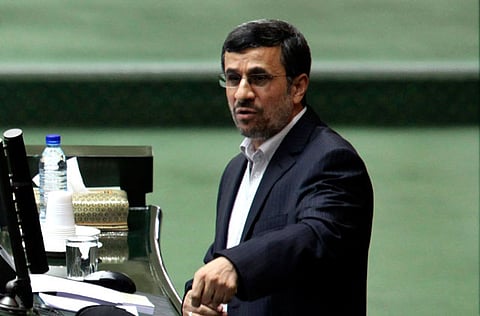Momentous opportunity for Iran to make a fresh start
Warm response from UAE and Saudi Arabia to Rouhani’s win augurs well for region

Iran finds itself in the media spotlight for all the right reasons for a change. The smooth and event-free presidential elections last week seem to have surprised many, including the Iran watchers and wonks in the West. This time around, the breathless excitement that had marked the international media coverage of the last presidential elections had been missing, probably because the West could not clearly identify the “dissidents or reformists” that could challenge and take on the regime. There had been no protests roiling the streets of Tehran either, presenting a cause celebre to be readily embraced and championed by the international community.
Hassan Rouhani is not the first Iranian leader to be democratically elected though. Except for the 2009 election that was fought violently and bitterly in the streets of Iran, the country has held successive peaceful elections that are largely seen as fair.
The past few years have easily been the most difficult and trying in Iran’s history as unprecedented international financial and political sanctions — driven by the US and its allies — have crippled the oil-driven economy, trade and everything else, not to mention the untold hardship inflicted on its people. Besides, Iran has lived perpetually under the shadow of an imminent Israeli attack with the direct or indirect support and blessings of Washington.
If the country has managed to hang in there in the face of great opposition and odds, it is largely because of the never-say-die spirit of its immensely proud and resilient people. The culture of self-reliance and indigenous solutions that the nation has evolved as a response to punitive western sanctions and the long and disastrous war with Saddam Hussain’s Iraq has also helped.
President Mahmoud Ahmadinejad earned himself many an ardent admirer and built his own constituency in and outside Iran with his simplicity and understated style of leadership and his constant defiance of the “Great Satan”. However, Ahmadinejad squandered a historic opportunity — and people’s mandate — to turn Iran around and guide it to a new dawn of hope at a time of great promise and possibilities. Unfortunately, the two tenures of the former Tehran mayor saw him forever obsessed with Iran’s nuclear programme at the expense of everything else, at a time when there were far more serious challenges demanding his attention.
Of course, this would not have been possible without the express blessings of the Supreme Leader, Ayatollah Ali Khamenei. However, the country has paid a heavy price for this magnificent obsession. The Iranian foreign policy has come to be a single-point, a one-dimensional agenda characterised by endless and pointless nuclear negotiations and international inspections.
Uniquely qualified
There is something called hikmat (wisdom in Persian). Nations have to make compromises for their long-term goals and interests. Confrontation seldom works and does more harm than good. Iran’s new leader stares, as Ahmadinejad did eight years ago, at a momentous opportunity to make a fresh start — both at home and in the country’s engagement with the world. As a scholar and member of the religious establishment and former military commander and nuclear negotiator known for his pragmatism, Rouhani is uniquely qualified and placed to give his nation a new positive direction.
For far too long Iran has remained isolated and cut off from the rest of the world largely because of its refusal to accept western diktats. Its Arab neighbours have been understandably concerned about its nuclear and military ambitions. The frequent military exercises and muscle flexing in Gulf waters and the talk of an impending West-Iran war have not helped either. A more affirmative and wise leadership in Tehran can go a long way in repairing Iran’s relations with its neighbours and the world and help restore peace and harmony in the region. The warm and enthusiastic response from the UAE and Saudi Arabia to Rouhani’s election therefore augurs well for the Middle East. Rouhani’s talk of “moderation winning over extremism” has also struck a positive chord in the West.
It is time for Iran to engage the world and assert its rights and role on the world stage. And to do so, it does not have to give in to anyone or give up its ideals and self-respect.
Like many other Muslim countries, the majority of the Iranians today are young. Born after the Revolution, they yearn for change and their rightful place in the world. Iran’s leaders cannot keep this lot forever waiting or unaffected by the winds of change sweeping the Middle East for the past few years. In the change of guard in Tehran, there is a chance for both Iran and the world community to make a bold, new beginning after years of missed opportunities. Is President-elect Hassan Rouhani up to the challenge?
Aijaz Zaka Syed is a commentator on the Middle East and South Asian affairs. Follow him on twitter at www.twitter.com/aijazzkaasyed.


